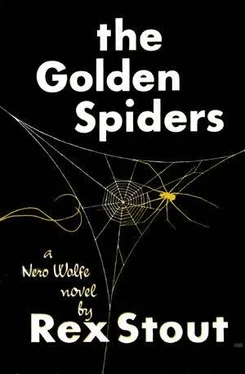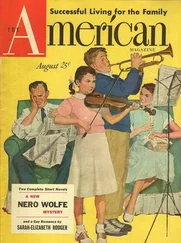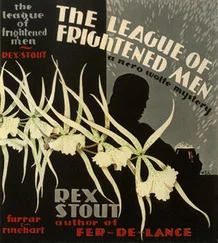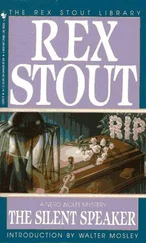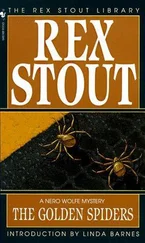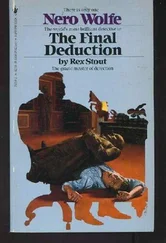“Dennis.”
“Where is his law office?”
“One-twenty-one East Forty-first Street.”
“Where does he live?”
“Three-fifteen Gramercy Park.”
“What kind of a car does he drive?”
“A fifty-one Chrysler sedan.”
“What color?”
“Black.”
“What’s his office phone number?”
“Ridgway three, four-one-four-one.”
“What’s his home number?”
“Palace eight, six-three-oh-seven.”
Cramer came to me. “Has this man had any chance to acquire all that information during the night?”
“He has not. No part of it.”
“Then that will do for now. Mr. Horan, you are being detained as a material witness in a murder case. Purley, take him to the other room — who’s in there?”
“Durkin and Panzer, with that Ervin.”
“Tell them to hold Horan, and come back.”
Horan stood up. He was calm and dignified. “I warn you, Inspector, this is a blunder you’ll regret.”
“We’ll see, Mr. Horan. Take him, Purley.”
The two left the room, Purley in the rear. Cramer got up and crossed to my wastebasket, dropped the remains of his cigar in it, and returned to the red leather chair. He started to say something to Wolfe, saw that he was leaning back with his eyes closed, and didn’t say it. Instead he asked me if he could be heard in the next room, and I told him no, it was soundproofed. Purley came back and went to his chair.
Cramer addressed Egan. “Okay, let’s have it. Is Horan in that racket?”
“I want a deal,” Egan said stubbornly.
“For God’s sake.” Cramer was disgusted. “You’re absolutely sewed up. If I had a pocketful of deals I wouldn’t waste one on you. If you want a break, earn it, and earn it quick. Is Horan in the racket?”
“Yes.”
“What’s his tie-in?”
“He tells me how to handle things, like people that are trying to get from under. Hell, he’s a lawyer. Sometimes he gives me leads. He gave me the lead on that Leopold Heim, goddam him.”
“Do you deliver money to him?”
“No.”
“Never?”
“No, he gets his cut from Birch. He did.”
“How do you know that?”
“Birch told me.”
“How did you get in it?”
“Birch. He propositioned me about two years ago, and I gave it a run. Three or four months later there was some trouble with a guy over in Brooklyn, and Birch fixed it for me to meet a lawyer at the garage to get a steer on it, and the lawyer was Horan. That was the first time I saw him. Since then I’ve seen him — I don’t know, maybe twenty times.”
“Always at the garage?”
“Yeah, always. I never met him anywhere but there, but I’ve talked with him on the phone.”
“Have you got anything in Horan’s handwriting? Anything he ever sent you or gave you?”
“No.”
“Not a scrap? Nothing?”
“I said no. That cagey bastard?”
“Was anyone else present at any of your meetings with Horan?”
“Sure, lots of times Birch was there.”
“He’s dead. Anyone else?”
Egan had to think. “No.”
“Never?”
“Not down in the basement with us, no. The night man at the garage, Bud Haskins, of course he saw him every time he came.” Egan’s eyes lit up. “Sure, Bud saw him!”
“No doubt.” Cramer wasn’t stirred. “Horan’s ready for that, or thinks he is. He’ll meet it by putting the word of a reputable member of the bar against the word of a low criminal like you backed up by a pal that he’ll say you have primed. I’m not saying Haskins can’t help. We’ll get him, and we’ll — where you going?”
Wolfe had pushed his chair back, got to his feet, and taken a step. He looked down at Cramer. “Upstairs. It’s nine o’clock.” He passed between his desk and Cramer and was on his way.
Cramer protested. “You actually — you walk out just when—”
“When what?” Wolfe demanded. Halfway to the door, he had turned. “You’ve got this wretch cornered, and you’re clawing away at him for something to implicate another wretch, that unspeakable Horan, in the most contemptible enterprise on record. I admit it’s necessary, indeed it is admirable, but I’ve contributed my share and you don’t need me; and I’m not after blackmailers, I’m after a murderer. You know my schedule; I’ll be available at eleven o’clock. I would appreciate it if you’ll remove these miserable creatures from my premises. You can deal with them just as effectively elsewhere.”
“You bet I can.” Cramer was out of his chair. “I’m taking your men along, all four of them — Goodwin, Panzer, Durkin, and Cather — and I don’t know when we’ll be through with them.”
“You may take the first three, but not Mr. Cather. He isn’t here.”
“I want him. Where is he?”
“You can’t have him. He’s on an errand. Haven’t I given you enough for one morning? Archie, do you remember where Orrie has gone?”
“No, sir. Couldn’t remember to save me.”
“Good. Don’t try.” He turned and marched out.
I have never seen as much top brass in one day as I did during the next eight hours, from nine in the morning to five in the afternoon that Tuesday, one week from the day Pete Drossos had called to consult Wolfe about his case. At the Tenth Precinct station house it was Deputy Police Commissioner Neary. At 24 °Centre Street it was the Commissioner himself, Skinner. At 155 Leonard Street it was District Attorney Bowen in person, flanked by three assistants, including Mandelbaum.
It didn’t go to my head because I knew it wasn’t just my fascinating personality. In the first place, the murder of Mrs. Damon Fromm, linked as it was with two other murders, was still, after four days, good for a thousand barrels of ink per day, not to mention the air waves. In the second place, the preliminary jockeying for a mayoralty election had started, and Bowen and Skinner and Neary were all cleaning fish ready for the fry. A really tiptop murder offers some fine possibilities to a guy who is so devoted to public service that he is willing to take on additional burdens in a wider field.
At Manhattan Homicide West, at the Tenth Precinct, we were separated, but that was okay. The only items we were saving were the crisscross we had used on Egan and his notebook, and Saul and Fred knew all about that. I spent an hour in a little room with a stenographer, getting my statement typed and read and signed, and then was taken to Cramer’s office for a session with Deputy Commissioner Neary. Neither Cramer nor Stebbins was there. Neary was gruff but chummy. His attitude implied that if they would just leave him and me alone for forty minutes we’d have it all wrapped up, but the trouble was that in less than half that time he got a phone call and had to let me go. As I was escorted along the corridor and downstairs and out to where a car was waiting, city employees I barely knew by sight, and others I didn’t know from Adam, made a point of greeting me. Apparently the impression was around that I was going to get my picture in the paper, and who could tell, I might get drafted to run for mayor. I acknowledged the greetings as one who appreciated the spirit in which they were offered but was awful busy.
At Leonard Street, Bowen himself, the District Attorney, had a copy of my statement on his desk, and during our talk he kept stopping me, referring to the statement, finding the place he wanted and frowning at it, and then nodding at me as if to say, “Yep, maybe you’re not lying after all.” He didn’t congratulate me on collaring Ervin and Egan and tricking Horan in. On the contrary, he hinted that my taking them to Wolfe’s house instead of inviting cops to the garage was probably good for five years in the coop if only he had time to read up on it. Knowing him as I did, I overlooked it and tried not to upset him. The poor guy had enough to contend with that day without me. His weekend had certainly been bollixed up, his eyes were red from lack of sleep, his phone kept ringing, his assistants kept coming and going, and a morning paper had put him fourth on the list of favored candidates for mayor. Added to all that, the FBI would now be horning in on the Fromm-Birch-Drossos case, on account of the racket Saul and Fred and I had removed the lid from, with the painful possibility that the FBI might crack the murders. So it was no wonder the DA didn’t ask me out to lunch.
Читать дальше
